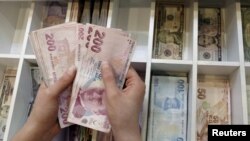Turkey's currency has fallen to a record low against the dollar amid concerns about an outflow of investor capital and the country's ability to manage the situation.
The lira weakened to over 4.80 per dollar on Wednesday, down some 5 percent since the previous day.
The drop puts pressure on the Turkish Central Bank to sharply increase rates before a scheduled monetary policy meeting on June 7. But it is seen to be reluctant as President Recep Tayyip Erdogan wants rates low.
Higher rates can support a currency and ease inflation, but also hinder economic growth by making borrowing more expensive.
The lira has lost more than 20 percent of its value against the dollar since the start of the year. The risk is that will increase the price of imports, making Turkish people effectively poorer. It could also encourage more investors to pull their money out if they expect that the value of their investments to drop as the currency declines.
Turkey's market jitters in part reflect a global trend in which the currencies of emerging economies have come under pressure. Economists say that is partly because the U.S. Federal Reserve is raising interest rates, encouraging investors to place their money in the U.S. instead of other economies.
Because Turkey is particularly dependent on foreign capital, its markets are one of those to have suffered most. Other countries that have seen sharp drops in their currencies include Brazil and Argentina.
But Turkey's currency has been hit particularly hard because of the complicated political backdrop. While a central bank is in theory independent from the government, Erdogan has put pressure on it to not raise rates as he prepares for early presidential and parliamentary elections next month.
Jason Tuvey, an economist with Capital Economics in London, says that if the central bank "continues to bow to pressure from Erdogan and refrains from raising interest rates, that would lead to an even sharper fall in the currency."
Deputy Prime Minister Bekir Bozdag on Wednesday cast the lira's drop as a foreign plot to harm Erdogan and affect the results of the polls.
"Those who believe that by manipulating the dollar they will lead to results that will harm the nation and their pockets and change the election result, are mistaken," the state-run Anadolu Agency quoted Bozdag as saying.
Muharrem Ince, the main opposition party's candidate who is challenging Erdogan at the June 24 presidential race, called on the Turkish leader to urgently halt interfering in the central bank's monetary policy and to ease concerns over fiscal discipline, warning that the "economy is about to hit the wall."








